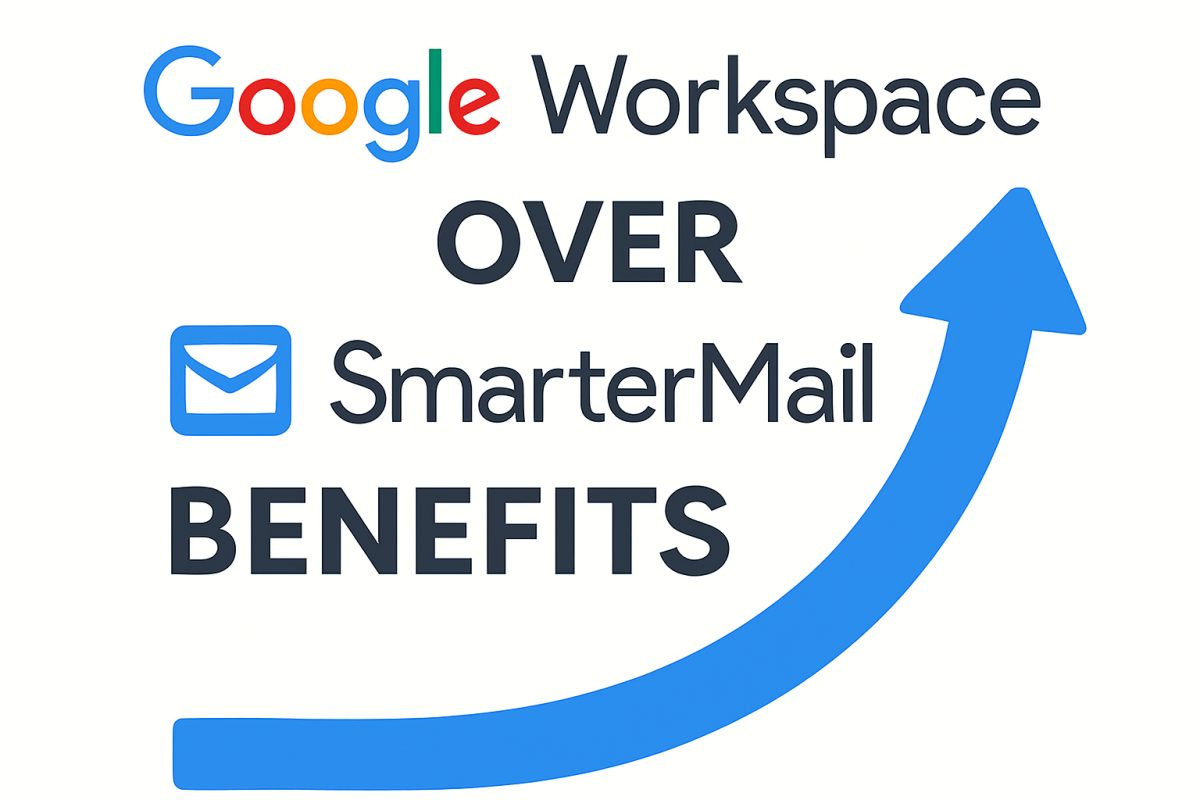Google Workspace offers enterprise-grade, cloud-native security features that significantly outpace SmarterMail’s on-premises capabilities, particularly for businesses handling sensitive data in regulated industries like finance, healthcare, or government. SmarterMail provides solid built-in protections such as anti-spam filtering (using greylisting, SPF, DKIM, and DMARC), antivirus integration (e.g., ClamAV or Microsoft Defender), and intrusion detection systems (IDS) for DoS protection. However, these are largely server-side and require manual configuration, third-party add-ons (like Cyren for advanced spam or Message Sniffer for malware), and ongoing IT maintenance to keep up with evolving threats. In contrast, Google Workspace leverages Google’s global infrastructure, AI-driven defenses, and automated compliance tools, reducing the burden on internal IT teams and providing proactive, scalable security without hardware investments.
Key security advantages include:
- Advanced AI-Powered Threat Detection and Prevention: Google Workspace uses machine learning in Gmail to block over 99.9% of spam, phishing, and malware automatically, including zero-day threats via real-time analysis. This is far more robust than SmarterMail’s rule-based filtering, which can miss sophisticated attacks without add-ons. For example, Google’s defenses scan attachments in a sandbox and block phishing links before they reach inboxes, while SmarterMail relies on integrated or external tools that may not update as dynamically.
- Zero-Trust Architecture and Multi-Factor Authentication (MFA): Workspace enforces zero-trust by verifying every user and device access, with built-in MFA (including hardware keys like FIDO2) and context-aware controls (e.g., blocking access from suspicious IPs or unmanaged devices). SmarterMail supports basic authentication but lacks native zero-trust; admins must configure it manually, increasing vulnerability to breaches if overlooked.
- Data Encryption and Sovereignty: Data is encrypted in transit (TLS) and at rest (AES-256), with options for customer-managed keys and data residency controls (e.g., storing data in specific regions like the EU for GDPR compliance). SmarterMail offers encryption but ties it to on-premises servers, exposing it to physical breaches or misconfigurations. Google’s global data centers also provide automatic failover and redundancy, minimizing downtime risks that on-premises setups like SmarterMail face during hardware failures.
- Compliance and Auditing Tools: Workspace is certified for ISO 27001, SOC 2/3, HIPAA, GDPR, and more, with built-in tools like Vault for eDiscovery, data retention policies, and audit logs. This simplifies regulatory audits without custom scripting. SmarterMail supports compliance (e.g., SOX, HIPAA via archiving), but it requires manual setup and third-party integrations, making it less efficient for large-scale corporate audits.
- Endpoint and Device Management: Integrated with Android, iOS, ChromeOS, and Windows, Workspace offers endpoint management for enforcing policies like device encryption and remote wipes. SmarterMail’s mobile sync (via ActiveSync) is functional but lacks this breadth, often needing extra tools for cross-platform security.
In corporate environments, these features reduce breach risks—Google reports zero account takeovers for adopters like Snap after implementing Workspace’s FIDO2 keys. On-premises solutions like SmarterMail have faced vulnerabilities (e.g., CVE-2019-7214 deserialization issues in older versions), highlighting the maintenance challenges.
Other Important Features for the Corporate World and Businesses
Beyond security, Google Workspace excels in scalability, collaboration, and cost-efficiency for businesses, addressing pain points of on-premises systems like SmarterMail. SmarterMail is a cost-effective Exchange alternative with features like shared calendars, tasks, group chat, and webmail, but it’s limited to email/groupware without the integrated ecosystem of Workspace. It requires server hardware, OS management (Windows/Linux), and IT expertise for updates, backups, and scaling—ideal for small setups but burdensome for growing enterprises. Workspace, as a fully cloud-based SaaS, eliminates these overheads, enabling remote/hybrid teams to collaborate seamlessly without infrastructure costs.
Collaboration and Productivity Tools
- Real-Time Collaboration Suite: Workspace integrates Gmail, Drive (30GB+ storage per user, unlimited in Enterprise), Docs, Sheets, Slides, Meet (up to 500 participants in Enterprise), and Chat for instant, version-controlled teamwork. Multiple users edit documents simultaneously with comments and suggestions—far superior to SmarterMail’s basic shared calendars/tasks, which lack AI enhancements like Smart Compose in Gmail or Gemini AI for summarizing meetings/docs. Businesses report reduced email silos and faster decision-making, as seen in HCLSoftware’s adoption for end-to-end control.
- AI and Automation: Gemini AI assists with email drafting, data analysis in Sheets, and video editing in Meet, boosting productivity by 20-30% for teams. SmarterMail has no native AI, relying on manual processes or add-ons.
- Scalability and Accessibility: Add users instantly without hardware upgrades; supports unlimited users in Enterprise plans. Access from any device/browser with offline sync—crucial for global teams. SmarterMail scales via licenses but ties to server capacity, risking downtime during peaks.
Cost and Management Efficiency
- Lower Total Cost of Ownership (TCO): Starts at $6/user/month (Business Starter), including unlimited storage options and no hardware/maintenance costs. SmarterMail’s upfront licensing ($499 for 250 users) plus server expenses (hardware, power, IT staff) often exceeds this long-term, especially for scaling businesses. Workspace’s automatic updates and 99.9% uptime SLA reduce IT overhead by up to 50%, per user testimonials.
- Admin Console and Integration: Centralized dashboard for user management, app controls, and SSO (e.g., with Active Directory). Marketplace integrates 100+ apps (e.g., CRM, Slack). SmarterMail’s API is robust but lacks Workspace’s ecosystem breadth.
- Reliability and Uptime: Google’s infrastructure ensures 99.9%+ uptime with global redundancy; no single-point failures like on-premises SmarterMail servers.
Compliance and Business Continuity
- Built-in Tools for Regulations: Vault for legal holds and eDiscovery; DLP to prevent sensitive data leaks (e.g., blocking SSNs in emails). Meets PCI-DSS, CCPA, and more out-of-the-box. SmarterMail requires custom setups for similar compliance.
In summary, for corporate use, Google Workspace’s cloud advantages—superior security automation, integrated collaboration, and reduced IT costs—make it ideal for scaling businesses, remote teams, and compliance-heavy sectors. SmarterMail suits cost-conscious, control-focused SMBs with in-house IT but falls short in modern, agile environments. If your business prioritizes ease and innovation over on-premises customization, Workspace delivers measurable ROI through productivity gains and risk reduction.
